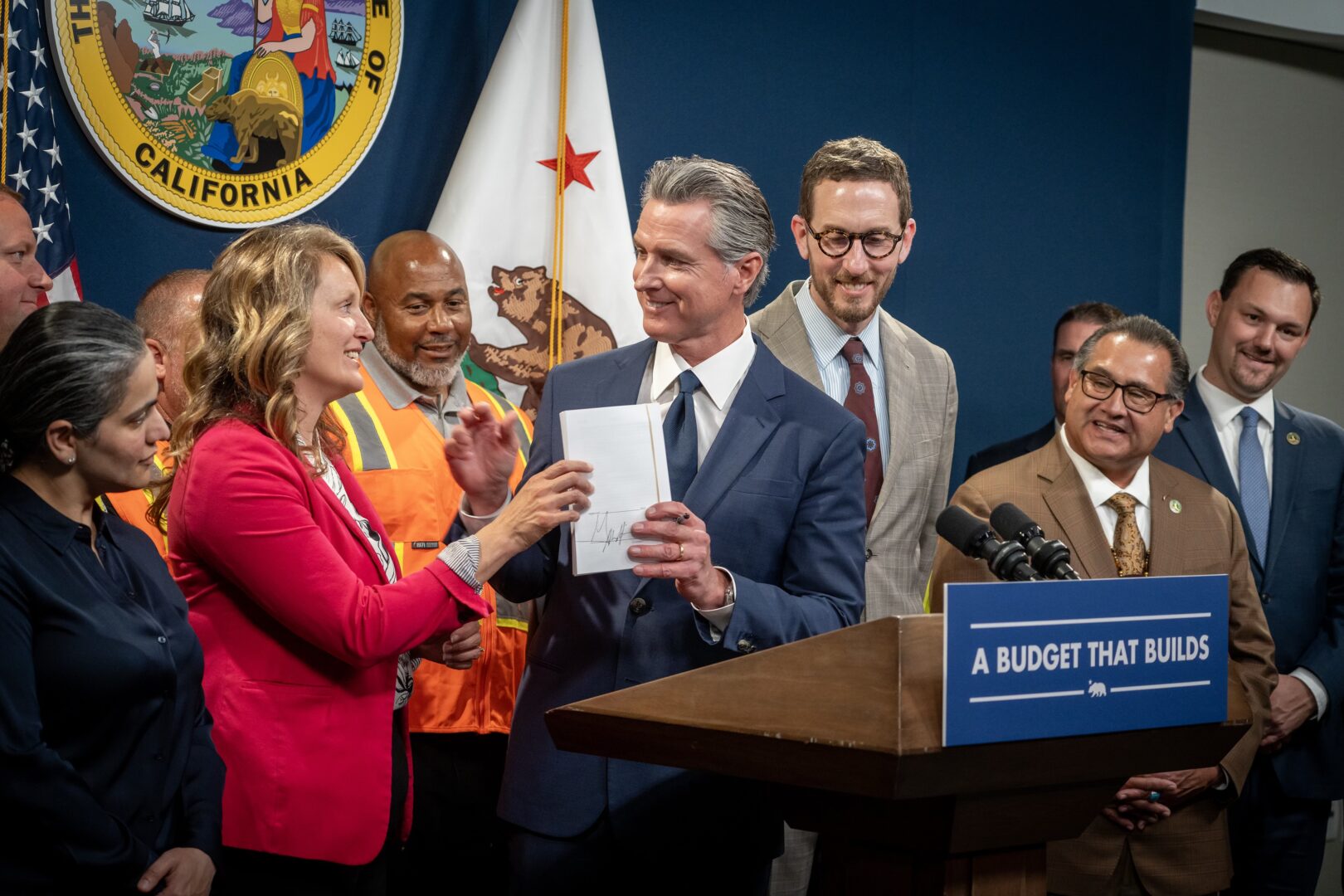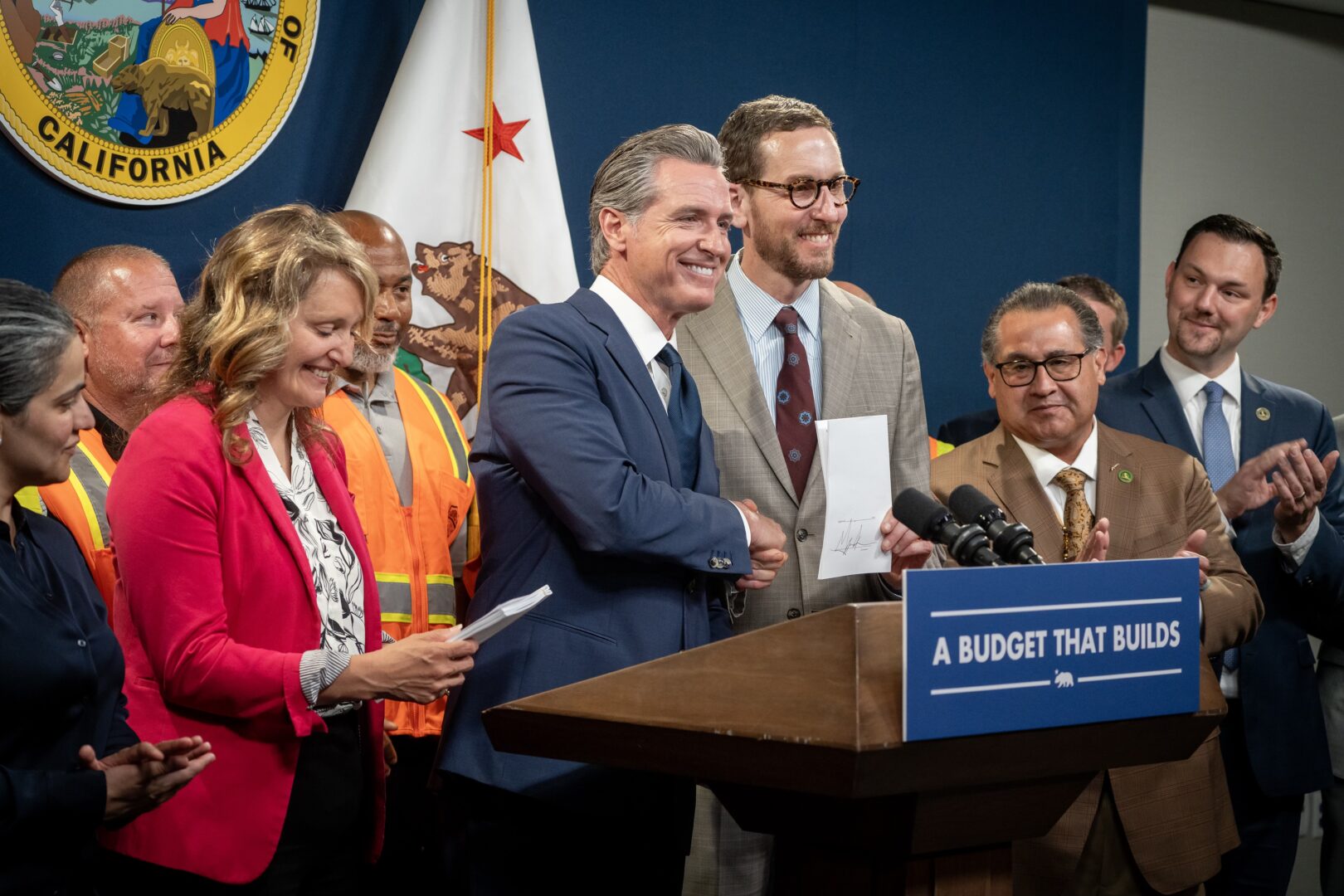
Governor Newsom signs into law groundbreaking reforms to build more housing, boost affordability
Advancing an abundance agenda
For decades, barriers have stood in the way of progress, blocking the urgency that would allow the state to address housing scarcity and better provide Californians with what they need: affordability and greater housing access.
This year’s budget reflects the Governor’s commitment to a more responsive and results-driven government — embracing a transformational abundance agenda focused on building more of what Californians need.
This housing and infrastructure package delivers foundational reforms to break down systemic barriers and help ensure California can meet the housing needs of current and future generations.
“With these historic laws, we finally have the tools we need to move the needle on affordability in California,” said Senator Scott Wiener. “It isn’t easy to make changes this big, but Californians are demanding an affordable future and it’s our job to deliver for them no matter what. I’m incredibly proud of the work Governor Newsom, Assemblymember Wicks, Speaker Rivas, and my friend and partner Pro Tem McGuire did to push this bold package across the finish line and set us on a path to build again in California.”

Game-changing reforms to build more, faster
The comprehensive streamlining framework is reflected across two key budget trailer bills—AB 130 and SB 131 —marking the most significant overhaul of California’s housing and environmental review laws in decades. The framework delivers on Governor Newsom’s vision by creating:
✅ CEQA Reforms to accelerate housing and infrastructure by streamlining CEQA review to speed up delivery of housing and infrastructure projects — including infill housing, high-speed rail facilities, utilities, broadband, community-serving facilities, wildfire prevention, and farmworker housing — while maintaining protections for natural and sensitive lands. Also exempts local governments’ rezoning from CEQA as part of their implementation of approved housing elements to accelerate site readiness.
✅Faster housing permitting and approvals by expanding the Permit Streamlining Act, limiting certain Coastal Commission housing appeals and speeding up Coastal permitting, and making permanent key provisions of the Housing Accountability Act and Housing Crisis Act.
✅ Regulatory stability to help control costs by freezing new residential building standards through 2031 with exceptions for emergency, fire, and conservation-related updates.
✅ Sustainable financing tools through the creation of innovative mechanisms to unlock long-term investment, including a revolving fund to reinvest equity from stabilized affordable housing into new developments through the Affordable Housing Excess Equity Program, and by establishing a statewide CEQA VMT Mitigation Bank to provide an optional compliance tool to allow developers to more effectively fulfill their existing CEQA mitigation obligations by funding location-efficient affordable housing and infrastructure projects.
✅ More accountability and enforcement by strengthening oversight of local homeless shelters by requiring annual inspections by cities and counties—whether or not complaints are received — and provides stronger enforcement by allowing civil actions by both individuals and the Department of Housing and Community Development, and also requires annual reporting from all jurisdictions and authorizes the state to withhold funding from cities or counties that fail to comply.
✅ Supporting renters by more than doubling the Renters Tax Credit, subject to future appropriations, increasing the credit to up to $500 for qualified filers.

“Mayors are on the frontlines of California’s housing and infrastructure crises, and although we work to provide for our residents, we need help from our State partners,” said Riverside Mayor Patricia Lock-Dawson, CA Big City Mayors Chair. “The Transit-Oriented Development Implementation Program in trailer bill AB 130 is a smart, forward-thinking approach that provides the flexibility cities need to meet our climate goals while still allowing for responsible development. When combined with the CEQA modernization measures in AB 130 and AB 131, cities are finally being equipped with the tools we need to deliver the housing, transportation, and infrastructure our residents deserve.”
“Counties strongly support the CEQA overhaul in the state budget package,” said CSAC President and Inyo County Supervisor Jeff Griffiths. “No longer will CEQA be leveraged to stall critical county wildfire, water and housing projects. This legislation will make California more affordable for families by helping to alleviate our housing crisis and, in turn, reducing homelessness.”
“The Carpenters want to thank Governor Newsom and those legislators that are keeping the housing crisis at the very top of the California legislative agenda,” said Douglas J. McCarron, President, United Brotherhood of Carpenters. “By streamlining housing construction, this budget will provide the legal foundation to get more homes built, bring housing costs down and add stronger enforcement of wage laws for thousands of construction workers on the job.”
“We applaud the governor and the legislature for this breakthrough reform package to streamline housing production,” said Matthew O. Franklin, President & CEO, MidPen Housing. “We know that increasing housing supply is key to solving our affordability crisis, and are confident these measures contribute to a future with more affordable, environmentally sustainable housing options for all Californians.”
Supporting local efforts
The enacted budget continues the Governor’s historic support for local governments tackling housing and homelessness — while strengthening accountability to ensure jurisdictions are complying with state law and using funds effectively.
The budget includes $500 million for HHAP Round 7 in 2026–27, contingent on enhanced accountability measures that require jurisdictions to maintain a compliant housing element, adopt encampment policies aligned with Administration guidance, and accept the reallocation of funds from jurisdictions that fail to meet performance benchmarks to those that deliver results.
Additional investments in homelessness response include:
- $81 million for the Home Safe Program
- $100 million for Encampment Resolution Funds
- $81 million for the Bringing Families Home Program
These targeted investments are designed to strengthen local capacity while reinforcing performance and compliance.
Homekey+ Awards
Building on ongoing support from voter-approved Proposition 1, the Governor today announced nearly $103 million in Homekey+ awards to five counties. This first round of funding will create more than 315 permanent supportive housing units, which include housing with supportive services for veterans and individuals experiencing or at risk of homelessness due to mental health and/or substance use disorders. These homes are projected to serve thousands of residents over their lifetime.
This initial round is part of a larger investment: $1.033 billion in Proposition 1 bond funds will be available through Homekey+ for cities, counties, housing authorities, and Tribal entities to develop housing for veterans. An additional $1.11 billion is available for projects serving broader target populations, supported by a combination of Proposition 1 and HHAP funds. Homekey+ applications are being reviewed and approved on a rolling basis—HCD has received 67 applications requesting over $1.14 billion as of June 24.
Reversing decades of inaction
The Newsom administration is making significant progress in reversing decades of inaction on homelessness. Between 2014 and 2019—before Governor Newsom took office—unsheltered homelessness in California rose by approximately 37,000 people. Since then, under this Administration, California has significantly slowed that growth, even as many other states have seen worsening trends.
In 2024, while homelessness increased nationally by over 18%, California limited its overall increase to just 3%—a lower rate than in 40 other states. The state also held the growth of unsheltered homelessness to just 0.45%, compared to a national increase of nearly 7%. States like Florida, Texas, New York, and Illinois saw larger increases both in percentage and absolute numbers. California also achieved the nation’s largest reduction in veteran homelessness and made meaningful progress in reducing youth homelessness.
Legislation included in today’s streamlining framework and budget trailer bills — AB 130 and SB 131 include:
- AB 609 by Assemblymember Buffy Wicks – California Environmental Quality Act: exemption: housing development projects.
- AB 306 by Assembly Member Nick Schultz – Building regulations: state building standards.
- AB 750 by Assemblymember Sharon Quirk-Silva – Homeless shelters: safety regulations.
- SB 607 by Senator Scott Wiener — California Environmental Quality Act: Infrastructure Projects.
- SB 681 by Senator Aisha Wahab — Housing.
The package also includes proposals championed by the Newsom Administration, including:
- Coastal Commission Permitting Reforms to ensure the Commission meets the same permit timelines as other agencies — bringing accountability and certainty to the process.
- The creation of a VMT Mitigation Bank under CEQA, giving developers a practical and climate-aligned tool to offset transportation impacts while funding affordable, infill housing.
- The Affordable Housing Excess Equity Program, which unlocks existing equity in stabilized affordable housing to reinvest in new production — creating a sustainable cycle of reinvestment.
The Governor also signed the following measures:
- AB 116 by the Committee on Budget — Health omnibus trailer bill.
- AB 137 by the Committee on Budget — State government.
- SB 129 by the Committee on Budget and Fiscal Review — Labor.
- SB 139 by the Committee on Budget and Fiscal Review — State Bargaining Unit 9 and State Bargaining Unit 12.
- SB 140 by the Committee on Budget and Fiscal Review — State Bargaining Unit 6.
Distribution channels:
Legal Disclaimer:
EIN Presswire provides this news content "as is" without warranty of any kind. We do not accept any responsibility or liability for the accuracy, content, images, videos, licenses, completeness, legality, or reliability of the information contained in this article. If you have any complaints or copyright issues related to this article, kindly contact the author above.
Submit your press release